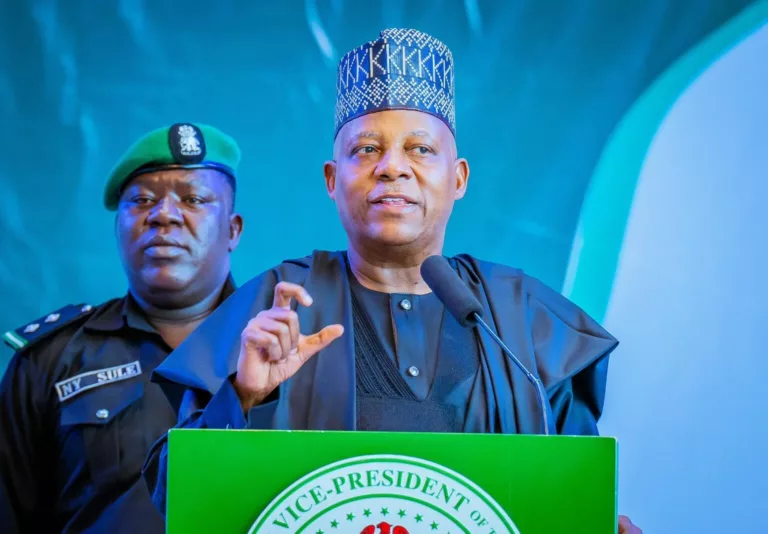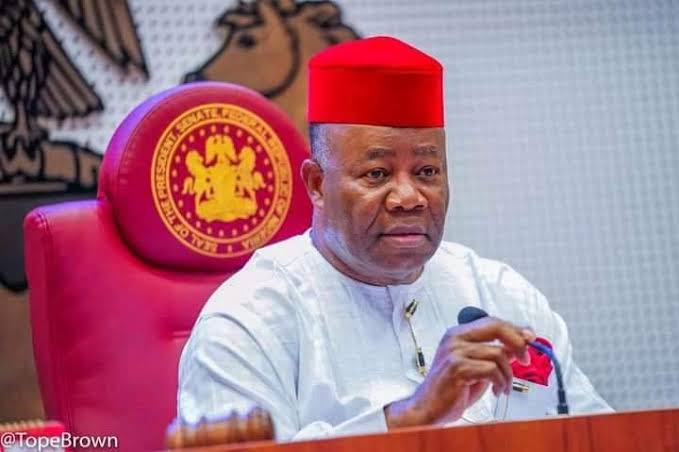Vice President Kashim Shettima has explained why Nigeria has one of the lowest tax-to-GDP ratios in the world.
He spoke on Friday in Abuja at the 2nd Joint Workshop on 2025 National Budget organised by the Association of National Accountants of Nigeria (ANAN) and the Chartered Institute of Taxation of Nigeria (CITN).
According to him, Nigeria has one of the lowest tax-to-GDP ratios globally because over the decades Nigeria developed into a nation where many people perfected the art of hiding their wealth from the government.
Shettima was represented by the Special Adviser to the President on Economic Affairs (Office of the Vice President), Dr. Tope Fasua, at the event themed, ‘2025 National Budget: A budget for Restoration and Aligning Resources for Sustainable National Development’.
“As we all know, National budgets are easily the most important financial document in the lives of peoples who reside in countries all over the world. Businesses and households alike take a cue from the information provided in budgets, which signal the thinking of national governments and embed critical data and metadata which informs the direction of businesses, household budgets, and personal strategies.
“Nigeria is a great country with immense prospects for all. But over the decades we developed into a nation where many people perfected the art of hiding their wealth from government. This is the reason why we have one of the lowest tax to GDP ratio in the world,” Shettima said.
He, however, said there is great prosperity in the nation and that that prosperity must be deployed to further the greatness of the nation, as nobody will develop this nation except Nigerians.
“The challenge is that all stakeholders must educate our publics and open their eyes to the need to invest in their own country. Enough of sending hard-earned money from Nigeria to purchase all sorts of assets abroad when we have development to do in our country, and the rates of return that you can obtain here is much higher than most other places, plus the psychological advantage of having invested in your own.
“Enough of dodging around and involving in financial malpractices when our tax rates are being reduced and no one is going after your turnover, but a bit of your profits, after you may have backed out all your expenses. The government has been made into a bogeyman, when the opposite is the case,” he added.
He noted that the 2025 budget, valued at N54.99trn, aims to reduce leakages and wastages, ensure value for money and prioritize investments in critical infrastructure and human capital development and that the budget also focuses on reducing the country’s debt burden, with a deficit of N13trn to be financed through a combination of public-private partnerships, local and foreign borrowing.
Speaking earlier, President and Chairman of Council of the CITN, Mr Samuel Agbeluyi, noted the significance of collaboration between professional institutions in shaping Nigeria’s fiscal policies.
“The 2025 budget presents a paradigmatic shift in fiscal policy, with a record-breaking allocation of ₦54.99trn. This unprecedented increase of 56.89% from the 2024 budget of ₦35.05trn necessitates a meticulous examination of revenue projections and expenditure allocations.
“A thorough analysis of revenue streams will be conducted to identify areas of improvement and optimization. Notably, this represents a significant increase from the 2024 revenue projection of ₦32.4trn.
“Debt servicing, allocated at ₦16.3trn, will be evaluated for its implications on fiscal sustainability. The impact of debt servicing on the nation’s fiscal health will be assessed, and recommendations for debt management will be proposed. In comparison, the 2024 budget allocated ₦12.3trn for debt servicing,” Agbeluyi said.
Also, President and Chairman of Council, ANAN, Dr. James Neminebor noted the need for a strategic blueprint that reflects the aspirations of the Nigerian people and aligns with sustainable national development goals.
He stressed the importance of effective budget implementation and exploring mechanisms for transparency, accountability and efficiency in public resource utilisation.
“As Nigeria stands at a pivotal juncture, requiring strategic interventions for economic stability and growth, this workshop is a testament to the collective commitment of financial professionals to drive sustainable national development,” Neminebor said.
On his part, the Minister of Budget and Economic Planning, Senator Abubakar Atiku Bagudu, said Nigeria is still spending below the expected threshold despite some outcry on the federal government rising local and foreign debts profiles.
“We have to confront decades of underinvestment, not because of any particular fault, but that is the reality. We have to mobilize the macroeconomic environment that can generate higher rates of growth that includes everyone, while at the same time delivering food security, providing security for all, providing opportunity for infrastructure development, as well as unlocking our potentials in the energy sector which includes an energy transition to a cheaper source of energy.
“How do we reduce deficit as a proportion of GDP? How do we ensure that the policies we put in place are supportive of market? How do we reform? How do we remove distortion in the economy, no matter how harmful it is?
“And in doing so, Mr President, remove subsidies, not because it’s pleasurable, but because it’s necessary. Why is that lost in subsidies? That even though they may benefit a few, but in general, the results are doubtful whether they benefit the majority. We removed the distortions in the foreign exchange market, which, again, is inevitable.
“Certainly, the distortions are gone. The allocation, the picking winners in the market are stopped. And with that consequence, the exchange rate has become what it is. And we are happy with what we have seen in the last 18 months. Deficit as a proportion of GDP has come down. Our sub-nationals are generating more revenue.
“But N54trn represents about 13 to 14 per cent of our GDP. And as people, most institutions, as people who view and understand the world from figures, you may want a relativity or a context to that. Is that too high? Is that too small? Because maybe that tells a story in itself,” Bagudu said.
WARNING: If You Are Not 18+, Don’t Click The Link Below 👇🫣
https://disloyalmoviesfavor.com/m3e85u39j?key=f0014e9d9438d5115e4d66e73ca3f04b
https://poawooptugroo.com/4/8902554
Please don’t forget to “Allow the notification” so you will be the first to get our gist when we publish it.
Drop your comment in the section below, and don’t forget to share the post.
Never Miss A Single News Or Gists, Kindly Join Us On WhatsApp Channel:
https://whatsapp.com/channel/0029Vad8g81Eawdsio6INn3B
Telegram Channel:
https://t.me/gistsmateNG



